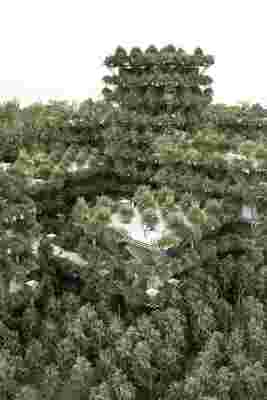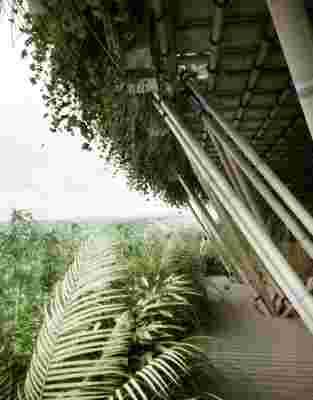Bamboo might just be the perfect natural building material. It’s abundant: The plant can grow up to four feet per day, and, when harvested, it regrows without having to be replanted. Not to mention, it’s two to three times stronger than steel. But few architects have explored the plant’s untapped potential as a construction mainstay. Enter Penda, a Beijing- and Vienna-based architectural firm that has been perfecting its blueprints for a modular bamboo structure for several years. The firm, founded in 2013, first unveiled plans to use bamboo for a project called One with Birds, which featured a hotel comprising bamboo tents and towers, inspired in part by tepees constructed by Native Americans. The basic tent unit, built using an X-shaped bamboo joint fastened with rope, can be articulated horizontally and vertically.

What Penda imagines a bamboo tower might look like.
Construction is relatively simple, requiring very little equipment. Even the scaffolding needed for building a bamboo tower can be made using bamboo. The benefits of bamboo structures, however, are greater than just construction ease. In many parts of the world, bamboo is readily available, replenishable, and, compared with other building materials, negligibly expensive. When growing, the plant releases nearly 35 percent more oxygen and absorbs nearly 35 percent more carbon dioxide than most trees. Canes from one building can be reused several times over in other projects. Bamboo structures can also be easily deployed as disaster shelters to many regions of the world.

Bamboo structures gain stability as they increase in size.
But Penda’s vision is even grander. The firm imagines an entire city built with its bamboo modules. By using the designs from its hotel concept, Penda estimates that a city of 200,000 inhabitants could be built by 2023 using a sustainable scheme for planting and building. Harvesting from 250 acres, the city builders would plant two canes of bamboo for each one they cut down for use in their city. The pace at which construction is completed is crucial to ensuring that the project makes as little environmental impact as possible. In late 2015, Penda built its first prototype, called Rising Canes, for Beijing Design Week, so perhaps soon bamboo structures will sprout up around the world.
